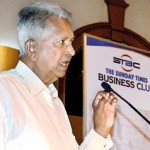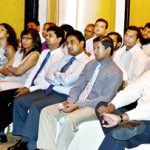Dilmah Tea saga marred by disappointments, pain, sorrow, insults – says its founder

Merril J.Fernando
Merrill J Fernando of Dilmah fame who has been fighting an unending and enduring battle for the last six decades, virtually single handed, to turn the Sri Lankan tea trade to be the hallmark of fully value added, single origin ethical pure Ceylon Tea, spoke of his arduous journey to success at the Sunday Times Business Club (STBC)’s monthly meeting last week.
He began on a sad note saying neither the governments nor the mass of Sri Lankan tea trade was unable to pick up his message, thus kicking a “golden opportunity” of making Sri Lankan tea famous as ‘Pure Ceylon Tea on top of the world’. Addressing a rapt audience of STBC members plus some guests at the club’s host hotel, Taj Samudra, Mr Fernando said, “the story of Dilmah is filled with disappointments, pain, sorrow, misunderstandings, insults and every wrong thing I can think of”.
The secret of his success supersedes the world’s best known multinationals which dominates the world tea trade, when he said that perseverance, total commitment and on top them the best quality always produces results. He also referred to divine support when he said “I cannot attribute for what the brand has achieved, I attribute all of it to the Good Lord”.

Audience. Pix by Hasitha Kulasekera
While walking through his total journey within little more than one hour, he said when everybody else was mixing low quality tea with Ceylon Tea, since the inception of the tea trade by ‘blending’ and when they were deceptively sold in the entire world as ‘Pure Ceylon Tea’ , around 24 years ago he stood up to the cause and brought up his dream brand “Dilmah” with pure ethical Ceylon Tea and the entire process of value addition – using the single origin product, printing and packaging, all done in Sri Lanka, took his branded product to Australian supermarkets with whom he had contacts.
Mr Fernando said that they were totally rejected by saying Pure Ceylon Tea was already in the market and was being sold in their supermarkets at very cheap prices than that of ‘Dilmah’. He took his products to Coles Supermarkets, Australia. The owner told him “Mr Fernando, the big boys – the multinationals know exactly what the consumer wants. So there is nothing you can offer. The consumer has to buy what is on the shelf and it is the best”. He said that it took him two years to convince Coles and he shipped the first container and it appeared in Coles Supermarket shelves.
He said, “After about 17 years Pure Ceylon Tea surfaced on any supermarket shelf”. He offered his product at $2.90 and market leader a multinational offered at $1.99 and within two months the multinational brought the price down to $ 1.40. Mr Fernando was shattered and dejected. He went and asked the buyer “What do I do now?” The buyer told him that he has got great news for Mr Fernando. Coles had received a large number of letters from the consumers who had tasted Dilmah and written to Coles, “Thank you for bringing Ceylon Tea back to us.” The major turning point of a strenuously hardworking man happened. He told the audience “Ceylon Tea and Dilmah has never looked back since the buyer assured that my consumers were there.” Dilmah is the No.2 brand in Australia, No.1 brand in New Zealand and No.1 in about 10 other smaller countries and is in about 100 other countries and considered ‘the most expensive tea’ in the world’.
The secret, he said, is in the quality and marketing the best product. “Your price must reflect the quality”. He said that Dilmah tea now sells at $9.99 while the well-known multinational sells at $8.99. He said that the tea industry is the inheritance of British rule in Sri Lanka over a period of 150 years. He said that the colonial culture has been where then Ceylon produced tea for the British middlemen to buy and the value addition to be done in Britain, in other colonies and big cities. The real money is made in other countries by value addition, branding and marketing. He said that this culture is ‘religiously’ followed by the Sri Lankan tea industry. He said that the British have done so much good for the Sri Lankan tea industry. They have created an image ‘Ceylon Tea’. Mr Fernando said that even today people around the world talk of Ceylon Tea as the best in the world, even, if some of them could not get it, buy it or sight it. He said the word Ceylon Tea is extremely powerful. He said that when he was 24 years he joined a family-owned British tea company and trained in London. He said he learnt everything about tea there.
He also saw what was happening to the Sri Lankan tea trade and the future of which appeared to be bleak, unless they do everything to protect it. He then thought of giving the best for the consumer and work for the uplifting of the Sri Lankan tea trade as he loved tea – to sell his own brand. He was appointed to the Tea Propaganda Board, the predecessor of the now Sri Lanka Tea Board during colonial times and when he suggested twice that Sri Lankan tea should be value added, branded and marketed through Sri Lanka, the idea was rejected. This suggestion was made around six decades ago. Though everybody understood what he meant, they did not know its significance.
He said that he watched the commoditization of tea and he believed that they would have to fight a very hard battle to save the industry from the big boys – the multinationals. He explained how the multinationals took over the value addition and eliminated the other competitors by means like discounting. They made everyone in the supply chain happy. He said that the consumers did not know that the product came from the same place, though there were several brand names. The multinationals were selling at cheap prices to eliminate the competitors. He said that once the competitors were eliminated the multinationals started increasing prices.
Mr Fernando noted that when he tried to promote branding, packaging and marketing in Sri Lanka the word got out and there were sabotage. He said that he used to make the same call over and over again but apparently nobody was responding. He said that a great harm was done to Pure Sri Lankan tea by allowing the blending of other cheap varieties that were imported. He said some of them though branded as Pure Ceylon Tea, in some cases there could be only five per cent of Pure Ceylon Tea and the balance mixed with cheap imported varieties and in some cases there would be no Ceylon Tea at all though they are branded as Ceylon Tea. He said that it would be disastrous to the future of the Sri Lankan tea trade, if the blending is allowed to continue when the consumers come to know how they are being deceived. But he said if single origin Pure ethical Ceylon Tea is branded, packed and marketed, its genuineness and quality could capture the whole world, as the entire world is aware that Ceylon Tea is the best tea in the world.
The club is sponsored by Etisalat and co-sponsored by Hameedia.
comments powered by Disqus


















